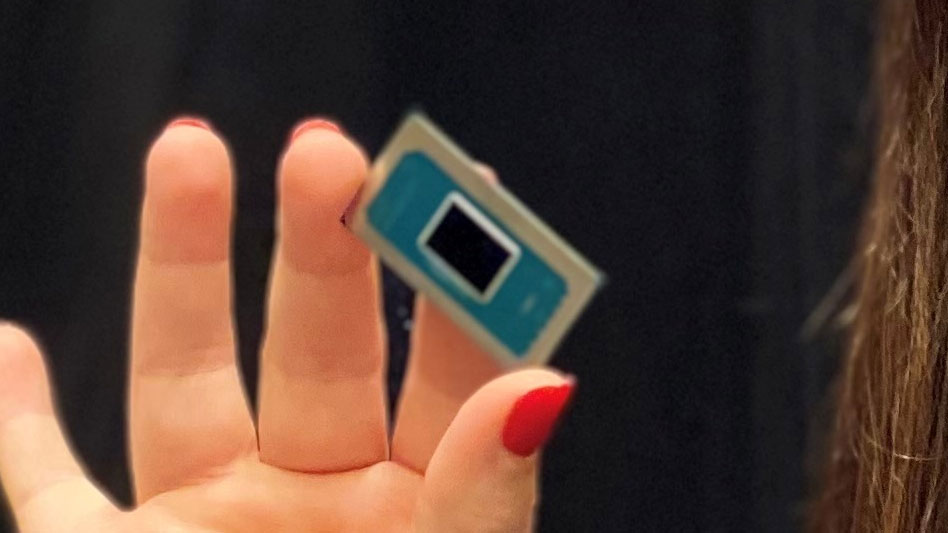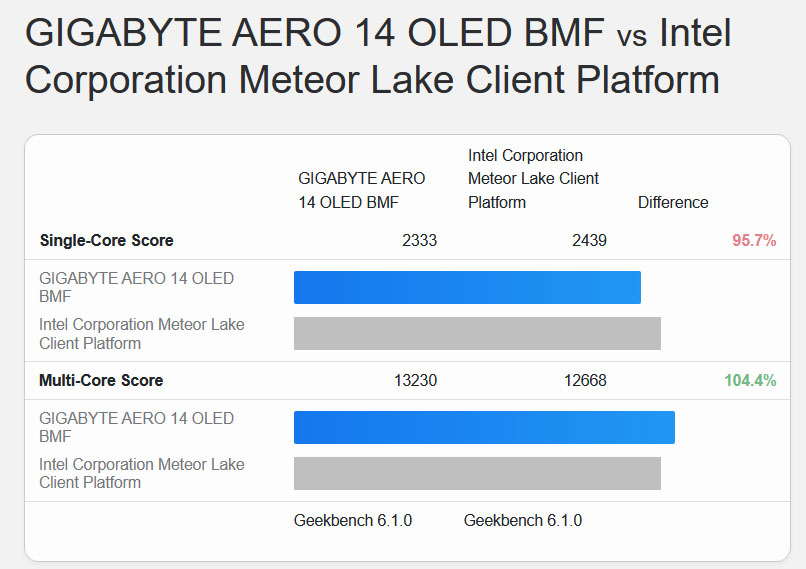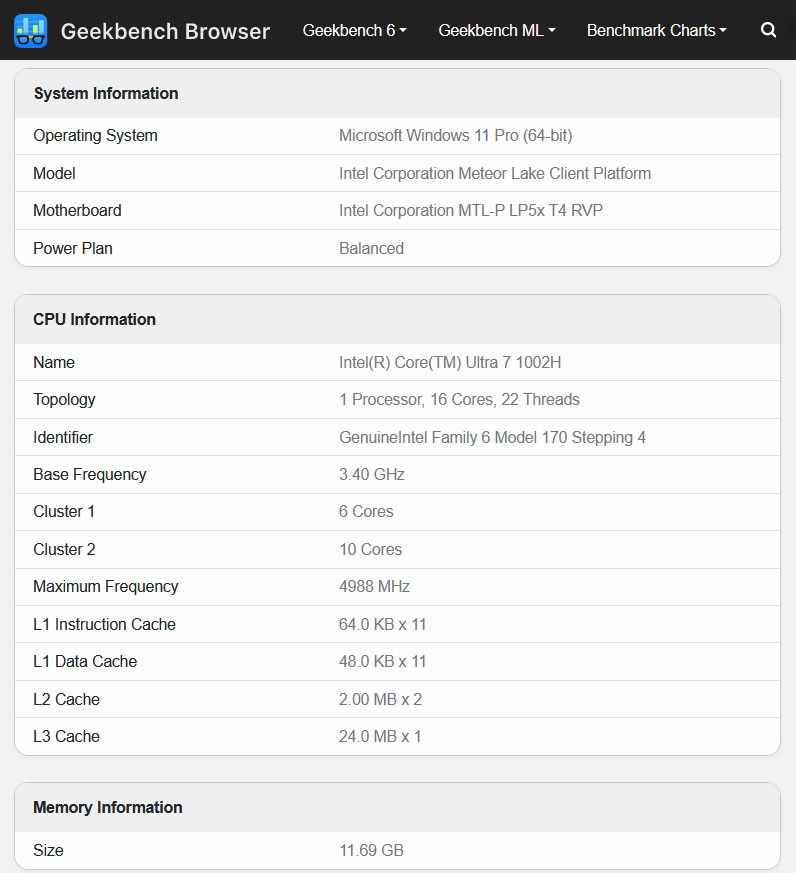Intel Meteor Lake Core Ultra 7 1002H Leaked in Geekbench
Results won't make owners of laptops with previous gen CPUs envious

What appears to be a test run of an “Intel Corporation Meteor Lake Client Platform” has appeared in the Geekbench online results database. Spotted by Twitter/X user Benchleaks, said system was tested today. The purported new Intel Core Ultra 7 1002H powered computer, perhaps a whitebook test platform, scored 2439 and 12668 in Geekbench 6 single- and multi-threaded tests, respectively.
According to the Geekbench database, the Intel Core Ultra 7 1002H features 16 cores and 22 threads. Two core clusters were recorded by the benchmarking software: one with six cores, the other with 10. If the first set of cores are performance cores with Hyperthreading, that would tally with the 16C / 22T configuration observed. Other specs revealed during the software’s probing of the system were that the Ultra 7 1002H ran at a base / boost of 3.4 / 5.0 GHz.
Using the Geekbench online UI, we made a comparison between the Core Ultra 7 1002H and what we think may be its direct predecessor, the Core i7-13700H (in a Gigabyte Aero laptop). Both are 7-series and H-series laptop chips, so this should be a fair comparison generation over generation.
|
Intel Mobile CPU |
Core Ultra 7 1002H |
Core i7-13700H |
|---|---|---|
|
Family |
Meteor Lake H |
Raptor Lake H |
|
Core config |
16C / 22T |
14C / 20T |
|
CPU clock |
1.7 – 4.8 GHz |
3.4 – 5.0 GHz |
|
L2 / L3 Cache |
2 MB x2 / 24 MB |
1.25 MB x2 / 24 MB |
| GB6 1T score |
2439 |
2333 |
|
GB6 nT score |
12668 |
13230 |
The system RAM reading of the Meteor Lake test laptop was unusual. Geekbench 6 said the system was packing 11.69 GB of RAM, but had no information about the memory type, transfer rates, or channels. Meanwhile, the rival Gigabyte Aero we selected for comparison had 16GB of DDR5-5200 in multi-channel configuration. We wonder if the Meteor Lake platform RAM detection issue was because of an esoteric new feature, like on-package LPDDR5X memory.
The single thread (1T) score of the purported new Intel Core Ultra 7 1002H is better than the Core i7-13700H laptop we put up for comparison. However, there are lots of other Core i7-13700H with better (and worse) Geekbench 1T scores. Similarly, there are Core i7-13700H laptops in the Geekbench database with better and worse multithreaded (nT) scores than the new MTL-H challenger. It is probably most disappointing that the Meteor Lake chip performed worse in the nT tests, as the design appears to have more cores at its disposal.
Overall, with just the single Core Ultra 7 1002H sample, there aren’t many conclusions that can be drawn. This is even more clearly the case as the results are so similar to a multitude of RPL-H predecessors in the Geekbench database.
Remember, Meteor Lake is Intel’s first foray into a mass produced consumer CPU which is chiplet-based. The strategy of splitting the 14th Gen Core processors between Raptor Lake Refresh for desktops and Meteor Lake for laptops hints that Intel had some difficulties affecting its original plans. However the iconic chip maker is making very confident noises about Meteor Lake.
Get Tom's Hardware's best news and in-depth reviews, straight to your inbox.
Intel and partners are widely expected to be preparing to launch Meteor Lake chips and laptops at the impending Innovation event. Intel’s event runs Sept. 19 - 20, 2023, at the San Jose Convention Center in California.

Mark Tyson is a news editor at Tom's Hardware. He enjoys covering the full breadth of PC tech; from business and semiconductor design to products approaching the edge of reason.
-
bit_user Hey, that's not bad. 4.5% faster 1T @ 96% of the clock speed. If we divide out the clockspeed difference, we get a 8.9% IPC improvement. It's not huge, but it's roughly on par with the improvement Apple claims for its A17.Reply
The multithreaded situation is a little more worrisome (95.7%), given that it's up by 2/2 cores/threads. However, these are probably their "ultra efficiency" cores, in the I/O tile, and therefore don't add a whole lot. Perhaps our clue that something's not right with the Intel 4 node should be the difference in base clocks (1.7 GHz vs. 3.4).
Anyway, wasn't Raptor Refresh rumored to hold the top-spec laptop CPUs? If true, that would be a warning that Intel 4 has some clock scaling problems. I'm finding this reminiscent of the Ice Lake vs. Whiskey Lake situation. -
JamesJones44 Reply
I had similar thoughts. I was also curious to what if anything the thermal envelope is playing. Are these both running at 45W/115W or is one set with a lower thermal limit? Even for that matter are they using the same chassis/cooling system. Maybe the 1002H is throttling more in multi thread tests due having a lesser cooling system.bit_user said:Hey, that's not bad. 4.5% faster 1T @ 96% of the clock speed. If we divide out the clockspeed difference, we get a 8.9% IPC improvement. It's not huge, but it's roughly on par with the improvement Apple claims for its A17.
The multithreaded situation is a little more worrisome (95.7%), given that it's up by 2/2 cores/threads. However, these are probably their "ultra efficiency" cores, in the I/O tile, and therefore don't add a whole lot. Perhaps our clue that something's not right with the Intel 4 node should be the difference in base clocks (1.7 GHz vs. 3.4).
Anyway, wasn't Raptor Refresh rumored to hold the top-spec laptop CPUs? If true, that would be a warning that Intel 4 has some clock scaling problems. I'm finding this reminiscent of the Ice Lake vs. Whiskey Lake situation.
The low 1.7 GHz clock rate is odd though, seem like there could be more to this story. One thing that is odd is the article says:
Other specs revealed during the software’s probing of the system were that the Ultra 7 1002H ran at a base / boost of 3.4 / 5.0 GHz
Which doesn't match what is in the table. However, the GB screenshot shows the max frequency to be 4.98 GHz so I wonder if the table or the article has typos (or both). -
kwohlt Reply
RPL should only be used in the HX laptop chips, which have always just been desktop chips repackaged for laptop. Can't have a MTL based HX chip if there's no MTL desktop dies.bit_user said:Anyway, wasn't Raptor Refresh rumored to hold the top-spec laptop CPUs? -
bit_user Reply
Tiger Lake had its own HX chip. To your point, that had all the signs of being a desktop CPU that simply never reached the desktop. Maybe it just got further along, before Tiger Lake-S got cancelled. The alternative of putting Rocket Lake in any kind of laptop also would've been a bit daft, so maybe the 8-core TGL was kept alive simply for the HX, and not due to any desktop ambitions.kwohlt said:RPL should only be used in the HX laptop chips, which have always just been desktop chips repackaged for laptop. Can't have a MTL based HX chip if there's no MTL desktop dies.

